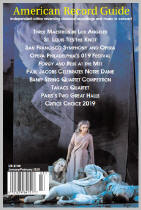Texte paru dans: / Appeared in: |
|
|
Outil de traduction ~ (Très approximatif) |
|
|
Reviewer: Charles
Brewer
Jean-Philippe Rameau’s act de
ballet from 1748, Pigmalion, has had a number of good performances (see
Jan/Feb 2018 for a balanced over-view). The story is well known, though the
libretto by Sylvain Ballot de Sauvot distills this into an argument between
Pygmalion and his soon to be jilted girlfriend, Cephise, the transformation
and love scene with “La Statue”, the dances she is taught by the Graces, and
the final chorus and ariette of love triumphant. This new release faces strong competition from the earlier recordings by William Christie (M/A 1993), Hervé Niquet (N/D 1993), James Richman (M/A 2011), Rousset, and Gustav Leonhardt (DHM 77143, 1981). Each of the singers on this new release is excellent, from the smaller roles of Cephise (Lieselot De Wilde), La Statue (Morgane Heyse), and Amour (Caroline Weynants), to Philippe Gagné’s impressive performance in the title role. There is only one aspect of this new recording that I cannot recommend—the addition of a very loud drum to the first section of overture and in some of the dances. While I find the interpretations by Christie, Niquet, Richman, and Rousset very elegant, my recommenda-tion remains with Leonhardt, who more clearly etches the dance rhythms and Pygmalion’s joy in the final ariette, ‘Règne amour’. Rather than an excerpt from another work by Rameau, this release includes a very different setting of the same myth, Jiri Antonin Benda’s melodrama, Pygmalion, from 1779. The combination of spoken text (the “drama”) with supportive musical accompaniment (the “melo”) was a rare 18th Century dramatic genre and Benda its most prolific advocate. In addition to Pygmalion, he composed Medea (M/A 1997) and Ariadne auf Naxos (M/A 1998). The only previous recording of Pygmalion was led by Christian Benda (also M/A 1998). This work consists mostly of a monolog by Pygmalion (very dramatically spoken by Norman D. Patske) and a short passage of dialog with the statue, here named Galathée (Morgane Heyse). Bernolet’s period instrument ensemble offers a much more subtle, supportive, and better paced accompaniment than Benda and at the moment is one of the best recordings of melodrama that I know. The booklet is informative and contains texts and translations.
| |
|
|
|
|
Cliquez l'un ou l'autre
bouton pour découvrir bien d'autres critiques de CD |
|




